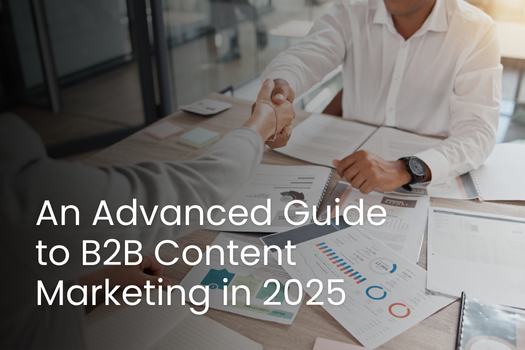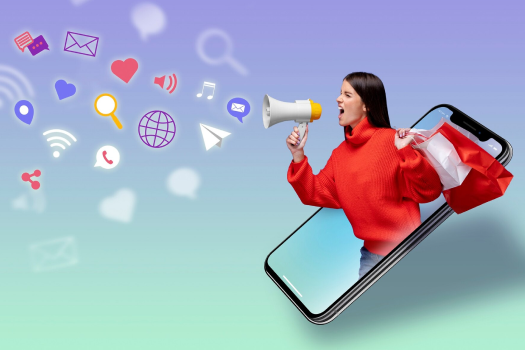According to 84% of B2B marketers, content marketing is a powerful tool for building brand awareness, which is crucial in making the sales cycles shorter because that’s where buyers take time to research and compare their options.
Content marketing helps by providing valuable information, building trust, and guiding prospects through decision-making.
This guide explains the key elements of B2B content marketing, why it’s important, the types of content to use, and how to build a successful strategy.
What Is B2B Content Marketing?
B2B content marketing involves creating and sharing valuable content to attract and engage businesses rather than individual consumers. The goal is to address businesses' specific needs, establish your brand as a trusted authority, and drive meaningful conversions.
This approach focuses on building relationships, as B2B buying cycles are typically longer and involve multiple decision-makers.
By providing educational and insightful content, you can influence decision-makers and guide them toward choosing your solution led by strong content marketing systems.
The Importance of B2B Content Marketing
Buyers conduct thorough research before making decisions, so delivering valuable, relevant, and engaging content is essential to standing out. A strong content marketing strategy builds brand awareness, nurtures relationships, drives leads, and shortens the path to conversion.
1. Building Credibility
Businesses rely on detailed research before making decisions. High-quality, insightful content positions your brand as an expert in the field, making potential customers more likely to trust and engage with your offerings.
2. Generating Qualified Leads
Compelling content helps attract businesses actively looking for solutions. Addressing their pain points ensures that the leads entering your funnel are high-quality.
3. Supporting the Buyer’s Journey
Content guides prospects at every funnel stage, from awareness to decision-making. Well-targeted material ensures prospects move seamlessly through the process.
4. Improving Visibility
Regularly publishing relevant content improves your search engine rankings and ensures your brand is visible when potential clients search for solutions.
7 Types of Content for B2B Marketing
The right content, from thought leadership articles to detailed case studies, can inform, educate, and inspire action. Understanding the various types of B2B content and how to use them strategically is key to creating a successful marketing campaign.
1. Blog Posts
Blog posts are an essential tool for educating and informing your audience. Depending on the content, they are most effective in the awareness stage but can also be used in other funnel parts.
-
Awareness Stage: Focus on general industry topics or common pain points without pushing for sales.
-
Consideration Stage: Use detailed guides or actionable tips that lead readers to take the next step, like downloading a resource or subscribing to updates.
Example: A blog titled "How to Improve Lead Generation in B2B Marketing" might include a CTA to download a related eBook.
2. Case Studies
Case studies demonstrate how your product or service has successfully addressed a customer’s problem. They are highly effective in deciding and providing real-world examples and measurable outcomes.
-
Structure: Introduce the problem, explain your solution, and highlight the results with precise data.
-
Use Case: To build trust, such as case studies on your website or share them during sales conversations.
3. White Papers & Industry Reports
These resources are valuable because they provide in-depth information and demonstrate your expertise.
-
White Papers: Focus on specific challenges or innovations relevant to your audience.
-
Industry Reports: Use data and research to provide insights into market trends or challenges.
4. Infographics
Infographics simplify complex information into visual formats, making them easy to understand and share. They are most effective at the awareness stage.
-
Usage: Use them to present statistics, comparisons, or processes in a way that grabs attention.
-
Distribution: Share infographics on social media, emails, or your website to boost engagement.
Example: An infographic titled "The B2B Marketing Funnel Simplified" can draw attention and drive traffic to your website.
5. Podcasts
Podcasts are great for engaging your audience with long-form, conversational content. They’re ideal for sharing industry insights, discussing trends, or hosting expert interviews.
-
Platforms: Distribute podcasts on Spotify or Apple Podcasts and embed them on your website.
-
Topics: Focus on addressing common industry challenges or showcasing customer success stories.
Example: A podcast episode on "Overcoming Common Challenges in B2B Sales" could establish your authority in the field.
6. Educational Videos
Videos are a highly engaging way to deliver information. They can serve multiple stages of the funnel depending on the content format:
Awareness Stage: Short, informative videos about industry trends or tips.
Consideration Stage: Product demonstrations or customer tutorials.
7. Testimonials
Testimonials provide social proof, helping potential customers trust your business. They can be used effectively at all stages of the funnel.
Formats: Video testimonials are more engaging and add a personal touch. Text testimonials should include the customer’s name and photo for credibility.
Usage: Place testimonials on your website, sales materials, and social media posts.
Example: A video testimonial featuring a client explaining how your product improved their operations can help build trust with prospective customers.
Best practices of marketing content strategy
Creating an effective B2B content marketing strategy in 2025 requires meticulous planning and focusing on delivering value. Here are the best practices to follow:
1. Identify Your B2B Content Goals
Start by defining what you want to achieve with your content marketing efforts. Goals could include:
-
Driving website traffic
-
Generating leads
-
Building brand authority
-
Nurturing relationships with existing clients
Establish measurable KPIs, such as website visits, lead conversions, or time spent on site, to track your progress.
2. Research Your Target Audience and Identify Their Needs
Understanding your audience is the foundation of any successful marketing strategy.
-
Who are they? Define key demographics, job roles, and industries.
-
What are their pain points? Identify challenges your audience faces in their daily operations.
-
Where do they consume content? Determine the platforms they frequent.
Leverage tools like surveys, interviews, and analytics to gather insights.
3. Conduct Competitive Analysis
Analyzing competitors helps you identify gaps in their content strategies that you can fill. Here's how to do it:
-
Audit Competitor Content: Evaluate their blogs, social media posts, and gated content.
-
Assess Performance: Look for engagement metrics such as shares, comments, and likes.
-
Identify Opportunities: Are there topics they’ve overlooked? Can you offer more depth or a unique perspective?
This insight helps you differentiate your strategy and gain a competitive edge.
4. Create Content for All Stages of the Marketing Funnel
The B2B buyer’s journey involves multiple stages, and your content should address each one:
Awareness Stage
Focus on educating your audience about their challenges. Content examples:
-
Blog posts
-
Infographics
-
Industry reports
Consideration Stage
Showcase your expertise and how you can solve their problems. Content examples:
-
Whitepapers
-
Webinars
-
Case studies
Decision Stage
Highlight your unique value proposition to drive conversions. Content examples:
-
Testimonials
-
Product demos
-
Personalized consultations
5. Optimize Content for Search Engines
SEO remains critical in 2025. Use relevant keywords, such as B2B content marketing strategy, throughout your content. Optimize headlines, meta descriptions, and alt texts for visibility.
6. Leverage Analytics to Refine Your Strategy
Measure the performance of your content regularly. Metrics like time on page, bounce rate, and lead conversion rates provide insights into what’s working—and what’s not. Use this data to refine and optimize your approach.
4 Major B2B Content Marketing Strategies
Effective B2B content marketing strategies are crucial for engaging target audiences and driving business growth.
1. Educational Content Creation
Focus on producing content that educates your audience about industry trends, challenges, and solutions. This can include how-to guides, whitepapers, webinars, and eBooks that position your brand as an authoritative resource.
2. Thought Leadership and Expert Insights
Share expert opinions, research findings, and case studies to demonstrate your knowledge and leadership in your field. Thought leadership content builds trust and establishes your brand as a credible voice in the industry.
3. Personalized Content for Target Segments
Tailor content to specific buyer personas or segments within your target audience. By addressing each group's unique pain points and interests, you can create more relevant and engaging content that resonates deeply.
4. Content Amplification and Distribution
Create a strategy to share and distribute your content across the right channels—social media, email, industry publications, or partnerships. Amplifying your content ensures it reaches a broader audience and increases its impact.
Conclusion
B2B content marketing in 2025 is about more than creating content—it’s about making the right content.
Aligning your efforts with business goals, addressing your audience’s needs, and maintaining a data-driven approach can help you drive long-term success and build meaningful relationships with other businesses.
Ready to take your B2B content strategy to the next level? Saffron Edge offers expert content marketing services tailored to your goals.
Contact us today and see how we can help you achieve measurable results!
The ultimate marketing toolkit
Frequently Asked Questions
What type of content is most effective for lead generation in B2B marketing?
Content formats like whitepapers, case studies, webinars, and gated ebooks are highly effective for lead generation. These formats provide valuable, in-depth information, encouraging prospects to share their contact details.
What is the role of educational content in B2B content marketing?
Educational content helps establish your brand as an authoritative source, builds trust with your audience, and addresses their needs by providing valuable insights and solutions.
How can thought leadership benefit my B2B marketing efforts?
Thought leadership positions your brand as an expert in the industry, enhances credibility, and fosters trust among decision-makers, making it easier to attract and engage prospects.
What is personalized content, and why is it important in B2B marketing?
Personalized content tailors messages to specific buyer personas, addressing their unique pain points and interests. This increases relevance and boosts engagement with your target audience.
How do I choose the right channels for content distribution?
Select channels based on where your target audience is most active, whether LinkedIn, industry blogs, email newsletters, or partner networks. Each platform offers different ways to engage with prospects.
How can educational content help in shortening the sales cycle?
By providing useful information early in the buyer’s journey, educational content builds trust and helps buyers make more informed decisions, accelerating the path from awareness to purchase.
What types of content should I include in a thought leadership strategy?
Include articles, blog posts, whitepapers, case studies, and expert opinions that showcase your deep knowledge and insights on industry trends and challenges.
How do I measure the success of my B2B content marketing strategies?
Track key metrics such as website traffic, lead generation, conversion rates, and engagement (likes, shares, comments) to evaluate the effectiveness of your content marketing efforts.
What are some common mistakes to avoid in B2B content marketing?
Common mistakes include creating generic content, ignoring audience segmentation, not having a clear content distribution plan, and failing to analyze and adapt based on performance data.
5X your B2B content marketing ROI
Choose a B2B content marketing agency that improves your buyer's journey, keeps your customers engaged, and boosts your marketing revenue.
Related Blogs
We explore and publish the latest & most underrated content before it becomes a trend.

Subscribe to Saffron Edge Newsletter!

The ultimate marketing toolkit










